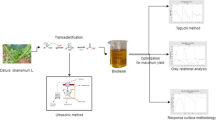Abstract
The conventional way of performing experiments has many drawbacks in terms of time and resources investments and lack of accuracy in analysis. Use of scientific tools for design of experiments (DoE) is a better approach for experimentation such that, minimum number of experiments can successfully give requisite aspects of analysis. Currently, many researchers still use the conventional way for performing experiments which results in higher utilization of resource and time investment, while the same objectives can be achieved by combined application of DoE with response surface methodology (RSM) which utilizes minimal efforts, time and resources. The experimental data from a published research paper have been considered as a case study in which conventional approach was used to decide to conduct experimental runs for transesterification process. The authors reported the optimized reaction conditions viz. methanol to oil molar ratio (6:1), catalyst amount (1 wt. %), reaction temperature (60 °C), and reaction time (15 min) for biodiesel production (98.1% yield) using hydrodynamic cavitation technique. They used a method of varying one factor at a time while the other three factors were constant. Twelve sets of experiments with total 176 number of sample observations were performed with varying factor conditions. Compared to this fifteen-run based on Box-Behnken technique with RSM has been used in the present study to predict the optimized reaction condition. The accuracy of the predicted yield and operating parameters were 99.99% and 99.8% respectively. Thus Box-Behnken DoE method with RSM is clearly a better approach as compared to the conventional one in terms of better resource utilization and time saving.
Access this chapter
Tax calculation will be finalised at checkout
Purchases are for personal use only
Similar content being viewed by others
References
Stenling, A., Ivarsson, A., Lindwall, M.: The only constant is change: analysing and understanding change in sport and exercise psychology research. Int. Rev. Sport. Exerc. Psychol. 10, 230–251 (2017)
Bezerra, M.A., Santelli, R.E., Oliveira, E.P.: Response surface methodology (RSM) as a tool for optimization in analytical chemistry. Talanta 76, 965–977 (2008)
Dejaegher, B., Vander, Heyden Y.: Experimental designs and their recent advances in set-up, data interpretation, and analytical applications. J. Pharm. Biomed. Anal. 56, 141–158 (2011)
Yu, P., Low, M.Y., Zhou, W.: Design of experiments and regression modelling in food flavour and sensory analysis: a review. Trends Food Sci. Technol. 71, 202–215 (2018)
Bravo-Linares, C., Ovando-Fuentealba, L., Mudge, S.M., Loyola-Sepulveda, R.: Application of response surface methodology to oil spill remediation. Fuel 103, 876–883 (2013)
Mousavi, L., Tamiji, Z., Khoshayand, M.R.: Applications and opportunities of experimental design for the dispersive liquid–liquid microextraction method–a review. Talanta 190, 335–356 (2018)
Omorogie, M.O., Naidoo, E.B., Ofomaja, A.E.: Response surface methodology, central composite design, process methodology and characterization of pyrolyzed KOH pretreated environmental biomass: mathematical modelling and optimization approach. Model Earth Syst. Environ. 3, 1171–1186 (2017)
Elfghi, F.M.: A hybrid statistical approach for modeling and optimization of RON: a comparative study and combined application of response surface methodology (RSM) and artificial neural network (ANN) based on design of experiment (DOE). Chem. Eng. Res. Des. 113, 264–272 (2016)
Ahuja, S.K., Ferreira, G.M., Moreira, A.R.: Application of Plackett Burman design and response surface methodology to achieve exponential growth for aggregated shipworm bacterium. Biotechnol. Bioeng. 85, 666–675 (2004)
Dharma, S., Masjuki, H.H., Ong, H.C.: Optimization of biodiesel production process for mixed Jatropha curcas–Ceiba pentandra biodiesel using response surface methodology. Energy Convers. Manag. 115, 178–190 (2016)
Behera, S.K., Meena, H., Chakraborty, S., Meikap, B.C.: Application of response surface methodology (RSM) for optimization of leaching parameters for ash reduction from low-grade coal. Int. J. Min. Sci. Technol. 28, 621–629 (2018)
Thakkar, K., Shah, K., Kodgire, P., Kachhwaha, S.S.: In-situ reactive extraction of castor seeds for biodiesel production using the coordinated ultrasound–microwave irradiation: process optimization and kinetic modeling. Ultrason. Sonochem. 50, 6–14 (2019)
Chuah, L.F., Yusup, S., Aziz, A.R.A.: Intensification of biodiesel synthesis from waste cooking oil (Palm Olein) in a hydrodynamic cavitation reactor: effect of operating parameters on methyl ester conversion. Chem. Eng. Process Process Intensif 95, 235–240 (2015)
Montgomery, D.C.: Design and analysis of experiements, 8th ed. Wiley (2015)
Sharma, A., Kodgire, P., Kachhwaha, S.S.: Biodiesel production from waste cotton-seed cooking oil using microwave-assisted transesterification: optimization and kinetic modeling. Renew. Sustain. Energy Rev. 116, 109394 (2019)
Author information
Authors and Affiliations
Corresponding author
Editor information
Editors and Affiliations
Rights and permissions
Copyright information
© 2021 The Editor(s) (if applicable) and The Author(s), under exclusive license to Springer Nature Singapore Pte Ltd.
About this paper
Cite this paper
Thakkar, K., Vhora, A., Kodgire, P., Kachhwaha, S.S. (2021). Effectiveness of RSM Based Box Behnken DOE over Conventional Method for Process Optimization of Biodiesel Production. In: Sahni, M., Merigó, J.M., Jha, B.K., Verma, R. (eds) Mathematical Modeling, Computational Intelligence Techniques and Renewable Energy. Advances in Intelligent Systems and Computing, vol 1287. Springer, Singapore. https://doi.org/10.1007/978-981-15-9953-8_14
Download citation
DOI: https://doi.org/10.1007/978-981-15-9953-8_14
Published:
Publisher Name: Springer, Singapore
Print ISBN: 978-981-15-9952-1
Online ISBN: 978-981-15-9953-8
eBook Packages: Intelligent Technologies and RoboticsIntelligent Technologies and Robotics (R0)




